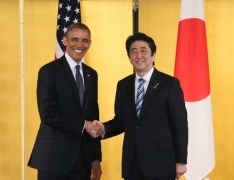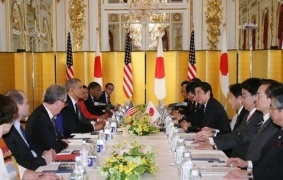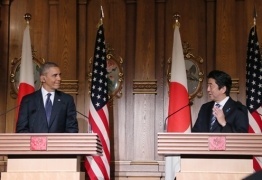Japan-United States of America Relations
Japan-U.S. Summit Meeting
April 24, 2014
 Photo: Cabinet Public Relations Office
Photo: Cabinet Public Relations Office
 Photo: Cabinet Public Relations Office
Photo: Cabinet Public Relations Office
 Photo: Cabinet Public Relations Office
Photo: Cabinet Public Relations Office
On April 24, commencing at 10:30 a.m. for approximately one hour and 45 minutes, Prime Minister Mr. Shinzo Abe held a Japan-U.S. Summit Meeting with the Honorable Barack H. Obama, President of the United States of America, who was visiting Japan as a state guest. The overview of the meeting is as follows.
1. Japan-U.S. Relations
(1) Overview
(i) At the beginning of the meeting Prime Minister Abe welcomed President Obama, and once again expressed gratitude for the support extended by the United States at the time of the Great East Japan Earthquake, including the Operation Tomodachi, in which more than 20,000 U.S. military personnel participated.
(ii) Following that, Prime Minister Abe stated the following:
- Japan has consistently been a peaceful nation, for approximately 70 years since the end of World War II. The alliance between Japan and the United States, the countries which share fundamental values of freedom and democracy as well as strategic interests, is irreplaceable as the cornerstone of peace and prosperity in the Asia-Pacific region.
- President Obama's visit to Asia underlines U.S. "rebalance policy," which emphasizes its engagement to the Asia-Pacific region. It contributes substantially to the peace and prosperity of the region and Japan strongly supports and welcomes it.
- The Abe Administration is proactively contributing more than ever to the peace and stability of the region under the policy of "Proactive Contribution to Peace" based on the principle of international cooperation.
(iii) The two leaders confirmed their respective governments recognize the "leading role the Japan-U.S. alliance plays in ensuring a peaceful and prosperous Asia-Pacific."
(2) Security
(i) Prime Minister Abe explained that the Government of Japan recently set out the "Three Principles on Transfer of Defense Equipment and Technology." Regarding the consideration on the relationship between the right of collective self-defense etc. and the Constitution, he stated that the Advisory Panel on Reconstruction of the Legal Basis for Security is expected to submit a report in the near future, and the Government of Japan would present its view on the issue after the submission of the report. In response, President Obama expressed his welcome and support for these efforts by Japan.
(ii) Additionally, the two leaders confirmed that both countries will promote wide-ranging security and defense cooperation, including the revision of the 1997 Guidelines for Japan-U.S. Defense Cooperation by the end of this year.
(iii) With regard to the Realignment of U.S. forces in Japan, Prime Minister Abe explained that the Protocol amending the 2009 Guam International Agreement was approved by the Diet, and stated that he would like to make steady progress on the transfer of U.S. Marines in Okinawa to Guam.
(iv) In addition, with regard to the relocation of Marine Corps Air Station (MCAS) Futenma, Prime Minister Abe stated that, with strong determination, he would like to proceed with the construction for the relocation promptly and steadily. He also mentioned that as Japan deals with the requests from the Governor of Okinawa such as suspending operations at MCAS Futenma within five years, with an attitude that it will do everything it can, he would like to advance the consideration while keeping adequate communication with the United States. Furthermore, he stated that, to begin with, the Government of Japan is working on increasing training of MV-22 Osprey outside Okinawa Prefecture, and that the cooperation of the United States is essential to moving these efforts forward.
(v) Furthermore, Prime Minister Abe stated that the Agreement to Supplement the Japan-U.S. Status of Forces Agreement (SOFA) on Environmental Stewardship needs to have substantial contents that fits with a mature alliance, and requested the cooperation of the United States.
(vi) In response, President Obama said that he would like to continue to make efforts to reduce the impact on Okinawa while ensuring smooth operations of U.S. forces in Japan.
(3) Economic affairs
(i) The Trans-Pacific Partnership (TPP)
The two leaders fully shared the view that the TPP will create an economic zone in the Asia-Pacific region, which is a growth center, and will give rise to new rules among countries that share the fundamental values of freedom, democracy and rule of law, and is strategically important. Takeing the opportunity of this Japan-U.S. Summit Meeting, Minister Akira Amari and U.S. Trade Representative Michael Froman will continue vigorous and sincere negotiations in order to resolve the pending issues between Japan and the U.S. Prime Minister Abe and President Obama instructed to Minister Amari and Ambassador Froman to accelerate the negotiations and conclude the entire TPP negotiations promptly. President Obama said the TPP is important to trade and growth of not only Japan and the U.S. but also of the Asia-Pacific region, and that he would like to have Minister Amari and Ambassador Froman to continue negotiations.
(ii) Energy and climate change
(a) Prime Minister Abe explained that the Government of Japan recently decided the Strategic Energy Plan, which states that Japan will continue to utilize nuclear power on the premise that safety is assured, and said Japan would like to continue cooperation on civil nuclear power. Also, Prime Minister Abe welcomed that export approvals have been granted to all the liquefied natural gas (LNG) projects that Japanese companies are involved with, and requested the continued cooperation toward the commencement of exports. President Obama agreed with the Prime Minister on the importance of energy cooperation.
(b) President Obama raised the issue of climate change, and Prime Minister Abe responded that he hopes to achieve an agreement on the post-2020 framework at the COP 21.
(iii) Superconducting Magnetic Levitation (SC MAGLEV)
Prime Minister Abe, mentioning about his recent trial ride with U.S. Ambassador to Japan Caroline Kennedy, once again proposed the introduction of MAGLEV technology into the Northeast Corridor and said he hopes U.S. cooperation for the project which would serve as a symbol of Japan-U.S. cooperation.
(iv) Medical care and health cooperation
Prime Minister Abe welcomed the agreement of cooperation between Japanese and American cancer research institutions.
(4) People-to-people exchanges
Prime Minister Abe said people-to-people exchanges between Japan and the United States have been the pillar of the post-war development of the alliance, and that he wants to further strengthen the exchanges toward the future. Additionally, Prime Minister Abe explained that through the government support, Japan decided to send 6,000 Japanese students to the United States this fiscal year.
2.Situation in Ukraine
(1) Prime Minister Abe stated the following on the Ukraine situation.
- Prime Minister Abe values the strong initiative that the United States has shown concerning the Ukraine problem. In the contemporary international community, any attempts to change the status quo by force cannot be tolerated, and this is a problem not just for one region, but for the whole international community.
- The Joint Geneva Statement that was announced following the four-party discussions is an important step toward a peaceful and diplomatic resolution of the problem. It is important that the contents of the declaration be implemented steadily and smoothly. However, since the occupation of public buildings by secessionists continues, Japan is paying close attention to the situation with grave concern and anxiety. It is necessary to encourage all of the relevant parties in order to bring calm to the situation.
- Japan intends to continue to provide as much support as it can in order to stabilize Ukraine. Japan will implement the assistance of approximately 1.5 billion dollars, which was already announced, for the improvement of the economy.
(2) Both leaders concurred to cooperate on the issue with the other G7 countries.
3.The situation in the Asia-Pacific region
(1) Overview
As awareness of the Asia-Pacific region, both leaders concurred on the importance that, placing Japan and the United States at the core, two countries should maintain a free and open Asia-Pacific region in cooperation with the relevant countries and engage China therein. To that end, both leaders confirmed the importance to firmly demonstrate the strengthening of the Japan-U.S. Alliance as well as the continuation of the "rebalancing policy" of the United States.
(2) North Korea
(i) Prime Minister Abe stated that they should maintain the pressure on North Korea to stop its nuclear development, and both leaders concurred to continue to closely cooperate trilaterally with the Republic of Korea (ROK).
(ii) Also, Prime Minister Abe asked for President Obama's continued understanding and cooperation in relation to the abduction issue, to which President Obama expressed his support.
(iii) In this regard, Prime Minister Abe noted that the United Nations Human Rights Council had adopted a resolution on the human rights situation in North Korea that was more strongly worded than any other of its resolutions, and he hoped to continue to cooperate closely with the United States a permanent member of the United Nations Security Council, on the follow-up of this resolution.
(3) Japan-ROK relations
Regarding Japan-ROK relations, Prime Minister Abe stated that it was extremely meaningful to hold the Japan-U.S.-ROK summit at The Hague Nuclear Summit by the leadership of President Obama. Also, he commented that friendly relations between Japan and the ROK are vital to the peace and stability of the Asia-Pacific region, and Japan would aim to communicate with the ROK on a variety of levels from a broad perspective, and that it would work with the ROK toward building a future-orientated cooperative relationship.
(4) China (including the South China Sea problems)
(i) Prime Minister Abe stated that both Japan and China share a responsibility for maintaining the peace and stability of the region and of the international community, and that while there are various concerns, Japan is responding in accordance with the spirit of "Mutually Beneficial Relationship based on Common Strategic Interests," and is actively calling on China to engage in dialogue.
(ii) Prime Minister Abe stated that, on the other hand, China was continuing its attempts to change the status quo by force or coercion, and that Japan has been responding in a calm and resolute manner regarding the Senkaku Islands. He further stated that it is important to clearly express oppositions to such attempts by China, including those in the South China Sea, and to show the robustness of the Japan-U.S. Alliance as well as U.S. strong commitments to Asia. President Obama responded that Article 5 of the Japan-U.S. Security Treaty covers all the territories under the administration of Japan, and such territory includes the Senkaku Islands. President Obama affirmed that the United States will oppose any unilateral action that seeks to undermine Japan's administration of the Senkaku Islands.
(iii) Both leaders confirmed that Japan and the United States would continue to closely exchange views on a variety of levels and maintain coordination in relation to their policies towards China.
(iv) Also, regarding the issue of the South China Sea, both leaders concurred that Japan and the United States will support a united response by ASEAN countries for the rule of law, including the support for the Philippines' arbitration proceedings.
4.The situations in other regions and global issues
(1) Prime Minister Abe stated that, placing the Japan-U.S. alliance at the center, he would like to promote trilateral cooperation between Japan, the United States, and the ROK; Japan, the United States, and Australia; and Japan, the United States, and India.
(2) Concerning the Middle East region, Prime Minister Abe expressed his respects to the efforts of the United States to stabilize the region including the response to the Iranian nuclear problem and the situation in Syria, as well as the support in the Middle East Peace. In addition, he stated that cooperation between Japan and the United States in the region are making progress, and that Japan would aim to continue its contribution in cooperation with the United States.
(3) Furthermore, the two leaders exchanged views on various global issues, including the empowerment of women, nuclear security, and disarmament and nonproliferation.

